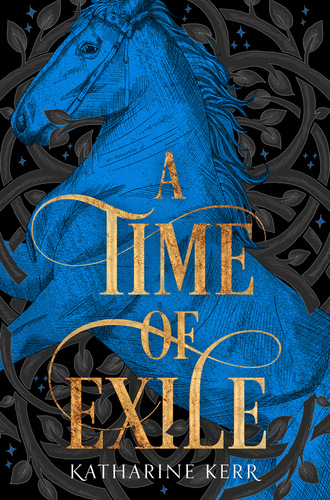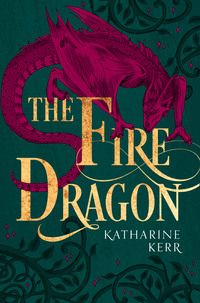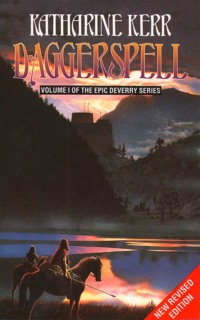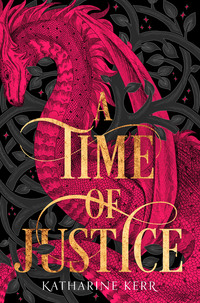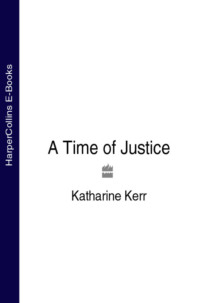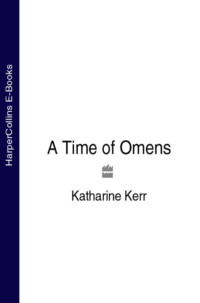At that time Eldidd was an independent kingdom, whose rulers were ultimately descended from the legendary warriors known as the Hippogriff and the Dragon, the two foster-brothers of King Bran himself who joined him for the Great Migration. In the year 297, after a bitter struggle over the kingship of Deverry, Cynaeval and Cynvaenan, their descendants and the current leaders of the two clans of the Dragon and the Hippogriff, with all their allies, kinsmen, supporters, and dependants, left Deverry to sail west and found their own throne and royal city. For years, the small colonies eked out a precarious existence along the sea coast, but in time the Dragon’s people flourished and spread up the great river valleys of the Dilbrae and the El, while the Hippogriff clan spread north from their town of Aberwyn up the Gwyn and the strangely named Delonderiel. In the year when Aderyn crossed the mountains of the Belaegyrys range into Eldidd, the kingdom boasted a respectable two hundred thousand people.
Because he needed to gather more medicines, Aderyn avoided the sandy coast road and chose the easy northern pass through the mountains. On the western side, he reached rolling hills, brown and scruffy with frost-bitten grass, and there he stumbled upon a tiny village in a secluded valley. The small square huts, roofed with dirty thatch, were made of rough-hewn wood packed with mud to keep out the chill. Grazing on the brown and stubbled grass were goats and a few cows. The village belonged to some of the Old Ones, those unfortunate folk who’d lived in the land before the blood-thirsty Deverrians had ridden their way to seize it from them. Dark-haired, on the slender side, they had their own immensely complex languages, or rather, a mutually incomprehensible group of them, which in the settled parts of Deverry and Eldidd were forbidden by the laws of their conquerors, but kept alive by stealth. When Aderyn rode up to the huts, the folk came running out to stare at him and his fine horse and mule. In a group, the eight men of the village advanced upon him with their rough spears at the ready, but when Aderyn spoke in their language and explained that he was a herbman, they lowered the weapons. Dressed in a long brown tunic, a man of about forty stepped forward, and introduced himself as Wargal, the head man.
‘You’ll forgive our greeting, but we have great reason to fear these days.’
‘Indeed? Are the men of Eldidd close by?’
‘The despicable blue-eyed ones are always too close by.’
For a moment they contemplated each other in an uneasy silence. Wargal’s eyes flicked back and forth between his folk and the stranger. He had a secret, Aderyn supposed, and he could guess it: the village was sheltering a runaway bondsman.
‘Are there any sick in your village?’ Aderyn said. ‘I have many herbs, and I’ll gladly help anyone who needs them in return for some fresh milk and a night’s shelter.’
‘Any stranger is welcome to milk from my flock. But if you can spare some medicine, one of our women has a bad case of boils.’
The villagers tended Aderyn’s horse and mule while Wargal took him to his own home, which had no furniture except for three big pottery jars near the tiny hearth and the straw mattress he shared with his wife. Hanging on the wall were a few bronze pots, a couple of knives of the same metal, and some rough cloth sacks. Aderyn sat down next to Wargal in the place of honour by the hearth while villagers crowded in for a look at this amazing event, a stranger in their village. After some polite conversation over bowls of goat’s milk, the woman with the boils was duly treated in the midst of the curious crowd. Other villagers came forward to look over the herbs and ask shy questions, but most were beyond his help, because the real plague in this village was malnutrition. Driven by fear of the Eldidd lords, they eked out a miserable living on land so poor that no one else wanted it.
Although Aderyn would have preferred to eat his own food and spare theirs, Wargal insisted that he join him and his wife in their dinner of goat’s milk cheese and thin cracker-bread.
‘I’m surprised you don’t have your winter crops in yet,’ Aderyn remarked.
‘Well, we won’t be here to harvest them. We had a long council a few days ago, and we’re going to move north. The cursed Blue Eyes get closer every day. What if one of their head men decides to build one of those forts along the road?’
‘And decides you should be slaves to farm for him? Leaving’s the wise thing to do.’
‘There’s plenty of open land farther north, I suppose. Ah, it’s so hard to leave the pastures of your ancestors! There’s a god in the spring nearby, too, and I only hope he won’t be angry with us for leaving him.’ He hesitated for a moment. ‘We thought of leaving last spring, but it was too much of a wrench, especially for the women. Now we have another reason.’
‘Indeed?’
Wargal considered him, studying Aderyn’s face in the flickering firelight.
‘You seem like a good man,’ Wargal said at last. ‘I don’t suppose you have any herbs to take a brand off a man’s face?’
‘I only wish I did. If you’re harbouring a runaway, you’d best move fast in case his lord comes looking for him.’
‘So I told the others. We were thinking of packing tomorrow.’ Wargal glanced around the hut. ‘We don’t have much to pack or much to lose by leaving – well, except the god in the spring, of course.’
Aderyn felt a sudden cold shudder of dweomer down his back. His words burned in his mouth, an undeniable warning that forced itself into sound.
‘You must leave tomorrow. Please, believe me – I have magic, and you must leave tomorrow and travel as fast as you can. I’ll come with you on the road a-ways.’
His face pale, Wargal stared at him, then crossed two fingers to ward off the evil eye, in case Aderyn had that, too.
On the morrow leaving took far longer than Aderyn wanted. Although the village’s few possessions were easily packed onto bovine and human backs, the goats had to be rounded up. Finally a ragged group of refugees, about eight families with some twenty children among them, the cows, the herd of goats, and six little brown dogs to keep the stock in line, went to the holy spring and made one last sacrifice of cheese to the god while Aderyn kept a fretful watch on the path behind them. By the time they moved out of the valley, it was well after noon, and the smaller children were already tired and crying from the smell of trouble in the air. Aderyn piled the littlest ones into his saddle and walked, leading the horse. Wargal and a young man, Ibretin, fell in beside him. On Ibretin’s cheek was the brand that marked him as a lord’s property.
‘If you think they’ll catch us, O Wise One,’ Ibretin said to Aderyn, ‘I’ll go back and let them kill me. If they find us they’ll take the whole tribe back with them.’
‘There’s no need for that yet,’ Wargal snapped.
‘There never will be if I can help it,’ Aderyn said. ‘I’d be twice cursed before I’ll let a man be killed for taking the freedom that the gods gave him. I think my magic might make us harder to find.’
Both men smiled, reassured by Aderyn’s lie. Although he could control his aura well enough to pass unnoticed and thus practically invisible, Aderyn couldn’t make an entire village disappear.
For two days they went north, keeping to the rolling hills and making a bare twelve miles a day. The more Aderyn opened his mind to the omens, the more clearly he knew that they were being pursued. On the third night, he scried into a campfire and saw the ruins of the old village, burnt to the ground. Only a lord’s warband would have destroyed it, and that warband would have to be blind to miss the trail of so many goats and people. He left the campfire and went to look for Ibretin, who was taking his turn at watching the goats out in the pasture.
‘You’ve called me Wise One. Do you truly think I have magic?’
‘I can only hope so. Wargal thinks so.’
It was too dark under the starry sky to see Ibretin’s face. Aderyn raised his hand and made the blue light gather in his fingers like a cool-burning torch. Ibretin gasped aloud and stepped back.
‘Now you know instead of hoping. Listen, the men chasing you are close by. Sooner or later, they’ll catch us. You offered to die to save your friends. How about helping me with a little scheme instead?’
At dawn on the morrow, while Wargal rounded up the villagers and got them moving north, Aderyn and Ibretin headed south. Although Aderyn rode, he had Ibretin walk, leading his pack-mule as if they’d been travelling together for some time as servant and master. About an hour’s ride brought them to the inevitable warband. They were just breaking their night’s camp, the horses saddled and ready to ride, the men standing idly around waiting for their lord’s orders. The lord himself, a tall young man in blue and grey plaid brigga, with oak leaves embroidered as a blazon on his shirt, was kicking dirt over a dying campfire. When Aderyn and Ibretin came up, the men shouted, running to gather round them. Aderyn could see Ibretin shaking in terror.
‘Oh, here,’ a man called out. ‘This pedlar’s found our flown chicken! Lord Degedd will reward you for this, my friend.’
‘Indeed?’ Aderyn said. ‘Well, I’m not sure I want a reward.’
With a signal to Ibretin to stay well back, Aderyn swung down from his horse just as Degedd came pushing his way through his men. Aderyn made a bow to him, which the lord acknowledged with a brief nod.
I’ve indeed found your runaway bondsman, but I want to buy him from you, my lord. He’s a useful man with a mule, and I need a servant.’
Caught utterly off-guard, Degedd stared for a moment, then blinked and rubbed his chin with his hand.
‘I’m not sure I want to sell. I’d rather have the fun of taking the skin off his cursed back.’
‘That would be a most unwise pleasure.’
‘And who are you to tell me what to do?’
Since Aderyn was not very tall, the lord towered over him with six feet of solid muscle. Aderyn set his hands on his hips and looked up at him.
‘Your men called me a pedlar, but I’m nothing of the sort. I’m a herbman, travelling in your country, and one who knows the laws of the gods. Do you care to question me further?’
‘I do. I don’t give a pig’s fart whether you’re a learned man or not, and anyway, for all I know, you lie.’
‘Then let me give you a sample of my learning. Enslaving free men to work your land is an impious thing. The gods have decreed that only criminals and debtors shall be bondsmen. That law held for a thousand years, back in the Homeland, and it held for hundreds here, until greedy men like you chose to break it.’
When his men began muttering, shame-faced among themselves at the truth of the herbman’s words, the lord’s face turned purple with rage. He drew his sword, the steel glittering in the sun.
‘Hold your ugly lying tongue, and give me back that bondsman! Be on your way or die right here, you scholarly swine!’
With a gentle smile, Aderyn raised his hand and called upon the spirits of fire. They came, bursting into manifestation with a roar and crackle of bright flame on the sword blade. Howling, Degedd struggled to hold on to the hilt, then cursed and flung the flesh-branding metal to the ground. Aderyn turned the flames to illusions and swung around, scattering bright but harmless blue fire into the warband. Yelling, shoving each other, they fell back and ran away to let their lord face Aderyn alone.
‘Now then, I’ll give you two copper pieces for him. That’s a generous price, my lord.’
His face dead-white, Degedd tried to speak, failed, then simply nodded his agreement. Aderyn untied his coin pouch and counted the coppers into the lord’s broad but shaking left hand, as the right seemed to pain him.
‘Your chamberlain will doubtless think you’ve made a fine bargain. And of course if you and your men return straight to your lands, there’s no need for anyone to ever hear this tale.’
Degedd forced out a tight sour smile. Doubtless he didn’t care to be mocked in every tavern in Eldidd by the story of how one herbman had bested him on the road, especially since no one would believe that the herbman had done it with magic. With a cheery wave, Aderyn mounted his horse and rode away, with Ibretin and the mule hurrying after. About a mile on, they looked back to see Lord Degedd and his warband trotting fast – away back south. Aderyn tested the dweomer warnings and felt that, indeed, all danger was over. At that he laughed aloud.
‘If nothing else,’ he told Ibretin. ‘That was the best jest I’ve had in a long time.’
Ibretin tried to smile but burst into tears instead. He wept all the way back.
That night there was as much of a celebration in the camp as their meagre provisions would allow. Aderyn sat at the biggest fire with Wargal and his wife while the rest of the villagers squatted close by and stared at him as if he were a god.
‘We have to let the goats rest a day, or they’ll stop giving milk,’ Wargal said, ‘Is that safe, Wise One?’
‘Oh, I think so. But you’d best travel a long way north before you find a place to settle down.’
‘We intend to. We were hoping you’d come with us.’
‘I will for a while, but my destiny lies in the west, and I have to go where my magic tells me.’
After three more days of slow straggling marching, the luck of Wargal’s tribe turned for the better. One afternoon they crested a high hill to see huts of their own kind spread out along a stream, prosperous fields, and pastures full of goats. When they came up to the village, the folk ran to meet them. There were only seven huts in the village, but land enough for many families. After a hasty tribal council, their headman, Ufel, told Wargal that he and his folk were welcome to settle there if they chose.
‘The more of us the better,’ Ufel said. ‘Our young men are learning a thing or two from the cursed Blue Eyes. Someday we’ll fight and keep our lands.’
Wargal tossed back his head and howled a war-cry.
Their journey over, the refugees camped that night along the streambank. The villagers brought food and settled in for talks to get to know their new neighbours. At Ufel the headman’s fire, Wargal and Aderyn drank thin beer from wooden cups.
‘I take it your folk have lived here for some time,’ Aderyn said. ‘May you always live in peace.’
‘So I hope. We have a powerful god in our valley, and so far he’s protected us. If you’d like I’ll show you his tree on the morrow.’
‘My thanks, I would.’ Aderyn had a cautious sip of the beer and found it suitably weak. ‘I don’t suppose any of the Blue Eyes live near you?’
‘They don’t. And I pray that our god will always keep them away. Very few folk of any kind come through here – one of the People, every now and then, that’s all.’
‘The who?’
‘The People. The Blue Eyes call them the Westfolk, but their own name for themselves is the People. We don’t see many of them any more. When I was a little child, they brought their horses through every now and then, but not recently. Probably the demon-spawn Blue Eyes have tried to enslave them, too, but I’m willing to bet that they found it a very hard job.’
‘From what I’ve heard, the Eldidd men have some kind of trade with them – iron goods for horses.’
‘Iron goods? The idiot Blue Eyes give the People iron?’ Ufel rose and paced a few steps away from the fire. Trouble and twice-trouble over that, then!’
‘What? I don’t understand. The Westfolk seem to want the iron, and …’
‘I can’t explain. For a Blue Eye you’re a good man, but telling you would be breaking geis.’
‘Never would I ask you to do such thing. I’ll say no more about it.’
On the morrow Aderyn rose before dawn and slipped away before the village was truly awake to spare everyone a sad farewell. He followed an ancient trail that wound through the barren pine-stubbed mountains without seeing a soul, either good or bad, until he rejoined the road. Even though the fields were ploughed and ready for the autumn planting, and orchards stood along the road, the houses were few and far between, and villages rare, unlike in Deverry. As he came closer to the river El, the real spine of the country, the houses grew thicker, clustering in proper villages. Finally, after six days on the road, he reached Elrydd, a proper town where he found an inn, not a cheap place, but it was clean, with fresh straw on the tavern room floor.
Aderyn paid over a few of his precious coins for the lodging, then stowed his gear in a wedge-shaped chamber on the upper storey. The innkeep, Wenlyn, served a generous dinner of thick beef stew and fresh bread, topped off with apple slices in honey. He also knew of the Westfolk.
‘A strange tongue they speak, break your jaw it would. A jolly sort of folk, good with a jest, but when they come through here, they don’t stay at my inn. Don’t trust ’em, I don’t. They steal, I’m cursed sure of it, and lie all the time. Can’t trust people who won’t stay put in proper villages. Why are they always riding on if they don’t have somewhat to hide, eh?’ Wenlyn paused to refill Aderyn’s tankard. ‘And they’ve got no honour around women. Why, there’s a lass in our very own town who’s got a bastard to one of them.’
‘Now here, plenty of Eldidd men sire bastards, too. Don’t judge the whole herd by one horse.’
‘Easy enough to say, good sir, and doubtless wise. But there’s just somewhat about these lads. The lasses go for them like cats do for catmint, I swear it. Makes a man nervous, it does, wondering what the lasses see in a bunch of foreigners. Huh. Women have got no sense, and that’s all there is to that.’
Aderyn smiled in bare politeness while Wenlyn sucked his teeth and sighed for the folly of lasses.
‘Tell me, good sir,’ Aderyn said at last, ‘If I ride straight west on the king’s road, will I eventually meet up with some of these folk?’
‘Oh, no doubt, but what do you want to do that for? If you do, be cursed careful of your mule and horse. They might take a fancy to them, like. But as to where, let’s think – never been there myself – but Cernmeton, that region, that’s where our merchants go to trade.’
‘My thanks. I’ll be leaving on the morrow, then. I’ve just got a fancy to take a look at these folk.’
Wenlyn stared at him as if he were daft, then left Aderyn to finish his meal in peace. As he sopped up the last of his stew with a bit of bread, Aderyn was wondering at himself. He felt something calling him west, and he knew he’d better hurry.
Out on the grasslands the seasons change more slowly than they do in the mountains. At about the time when Aderyn was seeing omens of autumn up in the Eldidd hills, far to the west the golden sunlight still lay hazy on the seemingly endless expanse of green. When the alar rode past a small copse of alders clustered around a spring, the trees stood motionless and dusty in the windless heat, as if summer would linger there forever. Dallandra turned in her saddle and looked at Nananna, riding beside her on a golden gelding with a white mane and tail. The elder elven woman seemed exhausted, her face as pale as parchment under her crown of white braids, her wrinkled lids drooping over her violet eyes.
‘Do you want to rest at the spring, Wise One?’
‘No need, child. I can wait till we reach the stream.’
‘If you’re sure-’
‘Now don’t fuss over me! I may be old, but I still have the wit to tell you if I need to rest.’
Riding straight in the saddle for all her five hundred years, Nananna slapped her horse with the reins and pulled a little ahead. With her second sight, Dallandra could see the energy pouring around her, great silver streams and pulses in her aura, almost too much power for her frail body to bear. Soon Nananna would have to die. Every day Dallandra’s heart ached at the thought of losing her mistress in the craft of magic, but there was no denying the truth.
Their companions followed automatically as they rode on. Earlier that morning, their alar had hurried ahead with the flocks and herds and left them a small escort of others who needed to move slowly. Enabrilia came first, leading the packhorse that dragged the heavy wooden travois with the tents. Her husband, Wylenteriel, their baby in a leather pack on his back, rode some distance behind and kept the brood-mares with their young colts moving at a slow but steady pace. His brother, Talbrennon, rode point off to one side. In the middle of the afternoon Nananna finally admitted that she was tired, and they made camp near a scattering of willow trees. Normally, since they were only stopping for one night, they wouldn’t have bothered to unpack the tents, but Dallandra wanted to raise one for Nananna.
‘No need,’ Nananna said.
‘Now here, Wise One,’ Wylenteriel said. ‘Me and Tal can have it up in no time at all.’
‘Oh, children, children, it’s not time for me to leave you yet, and when it’s time you can fuss all you like, but it won’t give me one extra hour:’
‘I know that’s true,’ Dallandra said. ‘But–’
‘No buts, child. If you know it, act on it.’
Wylenteriel, however, insisted on a compromise: he and Tal set up a small lean-to to keep the night damp off and unpacked cushions from the travois to lay on the canvas ground cloth. Dallandra helped Nananna settle herself, then knelt and pulled off the old woman’s boots. Nananna watched with a faint smile, her thin gnarled hands resting on her frail knees.
‘I’ll admit I could use a bit of a nap before dinner.’
Dallandra covered her with a light blanket, then went to help set up the camp. The men were already watering the horses at the stream; Enabrilia was sitting on the ground by a pile of dumped gear and nursing Farendar, who whimpered and fussed at her breast. He was only a year old, still practically a new-born by elven standards. Dallandra wandered downstream, driven by a sudden stab of omens. Even in the bright sunlight she felt cold, knowing that warnings were trying to reach her like slivers of ice piercing the edge of her mind, an image of winter, when something would tear her life in half and change her irrevocably. Nananna’s death, probably. With a shudder she ran back to the safe company of friends.
That night, while the others sat around a small campfire, Dallandra went to the lean-to. Nananna made a large ball of golden light and hung it on the ridge-pole, then rummaged through her saddle-bags for the small silver casket that guarded her scrying stones. There were five of these jewels, each set in a small silver disc graved with symbols: ruby for fire, topaz for air, sapphire for water, emerald for earth, and finally, the largest of them all, an amethyst for aethyr. Nananna laid the discs on a cushion and frowned at them for a moment.
‘I had a dream while I was napping, and I need to see a bit more. Hum, the amethyst will do.’
Carefully Nananna wrapped the other jewels up in bits of fine silk cloth, then laid the amethyst disc in the palm of her right hand. Dallandra knelt beside her and looked into the stone, where a small beam of light gleamed in the dead-centre, then swelled to a smoky void – or so it seemed to Dallandra. Nananna, however, watched intently, nodding her head every now and then at some detail. Finally she spoke the ritual word that cleared the stone of vision.
‘Now that’s interesting,’ Nananna said. ‘What do you think of it?’
‘Nothing. I couldn’t see.’
‘A man of magic is coming to us from the east. His destiny lies here, and I’m to take him in.’
‘Not one of those smelly Round-ears?’
‘Any man who serves the Light is welcome in my tent.’
‘Of course, Wise One, but I didn’t think a Round-ear would have the wits for magic.’
‘Now, now! Harsh words and prejudice don’t suit a student of the Light.’
‘I’m sorry.’
‘I don’t like the Round-ears much either, mind. But I’m trying. Do your best to try, too.’
In the middle of the next afternoon, they rode into the alardan, the great camp, where the People meet at the end of the summer after a long season’s wandering with their flocks and herds. That year the banadars of the scattered tribes had chosen the Lake of the Leaping Trout, the most southerly of a chain of four lakes along a wide river which the Eldidd men, with a characteristic lack of imagination, called simply Aver Peddroloc, the four-lake river. To the south stood a vast oak forest, tangled and primeval, that was a burying ground held sacred by the People for thousands of years. From the north shore spread an open meadow, where now hundreds of the brightly painted tents rose like flowers in the grass. Out beyond were flocks of sheep and herds of horses, watched over by a ring of horsemen.


